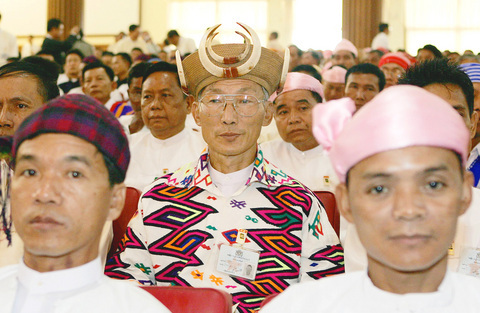Myanmar's military junta reopened a national constitutional convention yesterday, warning its citizens of the dangers of ``external and internal elements'' trying to derail the meeting, which they called a key step toward democracy.
Amid light security, 1,074 delegates -- including politicians, leaders of ethnic groups, workers, businesspeople and government employees -- gathered at a convention center about 40 km north of the capital Yangon to resume work. The session is set to last as long as two months but is unlikely to produce a final draft.
Lieutenant General Thein Sein opened the convention yesterday by telling delegates that the drafting of a constitution "was of primary importance to the transition to democracy."

PHOTO: AFP
"There is no other way but to implement the seven-step roadmap to achieve a genuine, disciplined and flourishing democratic state," Thein Sein said. "External and internal elements are trying to derail the national convention process at a time when it is going smoothly and successfully. Beware of the dangers of subversionists."
Thein Sein did not mention any nation or any group by name. But the convention comes after the US -- which has imposed economic sanctions on Myanmar and called it an "outpost of tyranny" -- successfully lobbied the UN Security Council on Friday to hold a closed-door briefing on the country.
Critics say the convention is being stage managed by the junta to stay in power. They say it cannot reflect the desires of the people when the main opposition party, Nobel laureate Aung San Suu Kyi's National League for Democracy (NLD), and other groups are not participating.
The NLD won a landslide victory in general elections in 1990 but the military refused to hand over power, saying the country first needed a new constitution. Suu Kyi has been under continuous detention for more than two years. Her house arrest was extended by six months last week, and she has been barred from the convention. Her party is boycotting the event.

Indonesia yesterday began enforcing its newly ratified penal code, replacing a Dutch-era criminal law that had governed the country for more than 80 years and marking a major shift in its legal landscape. Since proclaiming independence in 1945, the Southeast Asian country had continued to operate under a colonial framework widely criticized as outdated and misaligned with Indonesia’s social values. Efforts to revise the code stalled for decades as lawmakers debated how to balance human rights, religious norms and local traditions in the world’s most populous Muslim-majority nation. The 345-page Indonesian Penal Code, known as the KUHP, was passed in 2022. It

US President Donald Trump on Friday said Washington was “locked and loaded” to respond if Iran killed protesters, prompting Tehran to warn that intervention would destabilize the region. Protesters and security forces on Thursday clashed in several Iranian cities, with six people reported killed, the first deaths since the unrest escalated. Shopkeepers in Tehran on Sunday last week went on strike over high prices and economic stagnation, actions that have since spread into a protest movement that has swept into other parts of the country. If Iran “violently kills peaceful protesters, which is their custom, the United States of America will come to

‘DISRESPECTFUL’: Katie Miller, the wife of Trump’s most influential adviser, drew ire by posting an image of Greenland in the colors of the US flag, captioning it ‘SOON’ US President Donald Trump on Sunday doubled down on his claim that Greenland should become part of the US, despite calls by the Danish prime minister to stop “threatening” the territory. Washington’s military intervention in Venezuela has reignited fears for Greenland, which Trump has repeatedly said he wants to annex, given its strategic location in the arctic. While aboard Air Force One en route to Washington, Trump reiterated the goal. “We need Greenland from the standpoint of national security, and Denmark is not going to be able to do it,” he said in response to a reporter’s question. “We’ll worry about Greenland in

Auschwitz survivor Eva Schloss, the stepsister of teenage diarist Anne Frank and a tireless educator about the horrors of the Holocaust, has died. She was 96. The Anne Frank Trust UK, of which Schloss was honorary president, said she died on Saturday in London, where she lived. Britain’s King Charles III said he was “privileged and proud” to have known Schloss, who cofounded the charitable trust to help young people challenge prejudice. “The horrors that she endured as a young woman are impossible to comprehend and yet she devoted the rest of her life to overcoming hatred and prejudice, promoting kindness, courage, understanding